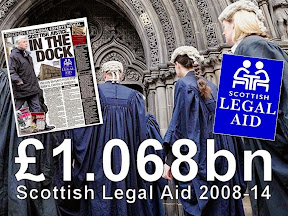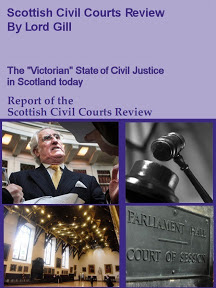 Scotland’s top judge Lord Hamilton. THE CREDIBILITY of highly restrictive arrangements Scotland’s top judge, the Lord President, Lord Hamilton wishes to impose on the introduction of McKenzie Friends to Scotland’s Courts have been called into question for a second time after Consumer Focus Scotland launched a stinging attack on Lord Hamilton’s February announcement to the Scottish Parliament’s Petitions Committee in which he stated he had decided to finally allow, albeit with as some have dubbed ‘draconian restrictions’, the appearance of McKenzie Friends (the well known courtroom assistants to party litigants) in Scotland’s courts some FORTY YEARS after their introduction in England & Wales.
Scotland’s top judge Lord Hamilton. THE CREDIBILITY of highly restrictive arrangements Scotland’s top judge, the Lord President, Lord Hamilton wishes to impose on the introduction of McKenzie Friends to Scotland’s Courts have been called into question for a second time after Consumer Focus Scotland launched a stinging attack on Lord Hamilton’s February announcement to the Scottish Parliament’s Petitions Committee in which he stated he had decided to finally allow, albeit with as some have dubbed ‘draconian restrictions’, the appearance of McKenzie Friends (the well known courtroom assistants to party litigants) in Scotland’s courts some FORTY YEARS after their introduction in England & Wales.
 Consumer Focus are the second consumer organisation to criticise overly strict plans for McKenzie Friends in Scotland. The latest criticisms by Scotland’s own consumer watchdog of Lord Hamilton’s apparently reluctantly announced plans for the introduction of McKenzie Friends come after UK wide consumer organisation WHICH? heavily criticised the Lord President’s plans to require those appearing as McKenzie Friends in Scotland’s courts to sign a certificate and give declarations of interest, requirements not commonly sought in any other jurisdiction which allows McKenzie Friends to assist the growing numbers of unrepresented party litigants now using our courts. You can read my earlier article on the criticisms from WHICH?, here : Consumer legal chiefs question Lord Hamilton’s plans for McKenzie Friends as calls grow for fairer deal for Scots court users
Consumer Focus are the second consumer organisation to criticise overly strict plans for McKenzie Friends in Scotland. The latest criticisms by Scotland’s own consumer watchdog of Lord Hamilton’s apparently reluctantly announced plans for the introduction of McKenzie Friends come after UK wide consumer organisation WHICH? heavily criticised the Lord President’s plans to require those appearing as McKenzie Friends in Scotland’s courts to sign a certificate and give declarations of interest, requirements not commonly sought in any other jurisdiction which allows McKenzie Friends to assist the growing numbers of unrepresented party litigants now using our courts. You can read my earlier article on the criticisms from WHICH?, here : Consumer legal chiefs question Lord Hamilton’s plans for McKenzie Friends as calls grow for fairer deal for Scots court users
 Consumer Focus expressed concerns over certification process of McKenzie Friends in Scottish Courts. Consumer Focus stated in their response to Holyrood : “Consumer Focus Scotland has particular concerns about the proposals for a certification process to be followed when an unrepresented litigant wishes to use a McKenzie Friend in the Court of Session. There is no requirement for such a process to be followed in England and Wales, where an unrepresented litigant would usually submit a letter to the court requesting to use a McKenzie Friend, or would inform a court official when attending a hearing. We are extremely disappointed by the rationale given for introducing such a certification process in Scotland. The rules state that a certificate is to be submitted ‘to enable the court to police the behaviour of a lay assistant and, in an extreme case, to exercise a sanction against him or her.’ This gives entirely the wrong impression about how the judiciary is to view and approach the function of a McKenzie Friend.”
Consumer Focus expressed concerns over certification process of McKenzie Friends in Scottish Courts. Consumer Focus stated in their response to Holyrood : “Consumer Focus Scotland has particular concerns about the proposals for a certification process to be followed when an unrepresented litigant wishes to use a McKenzie Friend in the Court of Session. There is no requirement for such a process to be followed in England and Wales, where an unrepresented litigant would usually submit a letter to the court requesting to use a McKenzie Friend, or would inform a court official when attending a hearing. We are extremely disappointed by the rationale given for introducing such a certification process in Scotland. The rules state that a certificate is to be submitted ‘to enable the court to police the behaviour of a lay assistant and, in an extreme case, to exercise a sanction against him or her.’ This gives entirely the wrong impression about how the judiciary is to view and approach the function of a McKenzie Friend.”
 A Judge or sheriff should be able to take action if a McKenzie Friend steps out of line : “We believe it is entirely appropriate that the sheriff or judge be given some discretion to take action where he/she is unhappy with the behaviour of a McKenzie Friend, such as warning them about their behaviour. However, McKenzie Friends in their traditional sense are in court in a supportive capacity to an unrepresented litigant. By providing moral support or indeed offering guidance, for example suggesting questions for the litigant to ask, a McKenzie Friend may help the litigant present their case better. We see this as an advantage not only to the unrepresented litigant but also to the court and the other party in the litigation. If these advantages are to be realised in practice, it will be necessary for McKenzie Friends to be approached in a positive way by the bench.”
A Judge or sheriff should be able to take action if a McKenzie Friend steps out of line : “We believe it is entirely appropriate that the sheriff or judge be given some discretion to take action where he/she is unhappy with the behaviour of a McKenzie Friend, such as warning them about their behaviour. However, McKenzie Friends in their traditional sense are in court in a supportive capacity to an unrepresented litigant. By providing moral support or indeed offering guidance, for example suggesting questions for the litigant to ask, a McKenzie Friend may help the litigant present their case better. We see this as an advantage not only to the unrepresented litigant but also to the court and the other party in the litigation. If these advantages are to be realised in practice, it will be necessary for McKenzie Friends to be approached in a positive way by the bench.”
Lord Hamilton’s plans for requiring the signing of a certificate by a party litigant & their McKenzie Friend were called into question : “We are also concerned that the information required to be provided within the certificate is contradictory and could be confusing for consumers. Our interpretation of the proposals is that a person related to the litigant will not be excluded from acting as a McKenzie Friend. However, it is unclear how such a person could be said to have ‘no interest in the case,’ and we are not clear in any case why the fact that someone is a relative of the litigant is of any relevance.”
Consumer Focus went onto criticise Lord Hamilton’s requirements of a potential McKenzie Friend’s “relevant experience” : “We are also unsure of what is intended to be demonstrated in terms of ‘relevant’ experience to act as a McKenzie Friend, nor why evidence of such experience should be necessary. In many circumstances, particularly where a McKenzie Friend is related to the litigant, or being brought along because they are a close friend or colleague, the McKenzie Friend is unlikely to have any prior court experience. The requirement to provide evidence of ‘relevant experience’ also introduces an element of professional services which appears somewhat contrary to the requirement that a McKenzie Friend receive no remuneration for their services, and to the Lord President’s proposal that they would not be able to act as the party’s agent.”
Oddly however, Consumer Focus Scotland chose to support plans to forbid McKenzie Friends from being paid for their assistance, this despite case law & accepted practice in England & Wales where McKenzie Friends can receive payment for their services, payments which are usually significantly lower than what a solicitor would charge their client. Consumer Focus said on the issue of payment to McKenzie Friends in Scotland : “We support the view expressed both by the Lord President and the Scottish Civil Courts Review that McKenzie Friends should not be remunerated for their assistance. We believe this is a necessary measure to protect consumers from unscrupulous practice emerging.”
 Consumer Focus continued, raising fears of party litigants being disadvantaged without a McKenzie Friend against opposing legal teams : “We would worry about the effect of such formal rules on the use of McKenzie Friends in court. As was stated in our earlier evidence to the Committee, we know from our own research with sheriff court users, and indeed from other research, that many people experience considerable anxiety when attending court. Unrepresented litigants are very often faced with a solicitor representing the other side, within an intimidating and formal setting dominated by lawyers wearing formal dress and using legal language. We have long been concerned that this places unrepresented litigants at a potential disadvantage in court proceedings and indeed may deter people from pursuing legal action. Having the support of a McKenzie Friend could help take away some of the fear associated with appearing in court and therefore potentially improve the experience of unrepresented litigants in court.”
Consumer Focus continued, raising fears of party litigants being disadvantaged without a McKenzie Friend against opposing legal teams : “We would worry about the effect of such formal rules on the use of McKenzie Friends in court. As was stated in our earlier evidence to the Committee, we know from our own research with sheriff court users, and indeed from other research, that many people experience considerable anxiety when attending court. Unrepresented litigants are very often faced with a solicitor representing the other side, within an intimidating and formal setting dominated by lawyers wearing formal dress and using legal language. We have long been concerned that this places unrepresented litigants at a potential disadvantage in court proceedings and indeed may deter people from pursuing legal action. Having the support of a McKenzie Friend could help take away some of the fear associated with appearing in court and therefore potentially improve the experience of unrepresented litigants in court.”
 Lord Woolman granted Scotland’s first Civil Law McKenzie Friend. The case that broke the forty year mould on McKenzie Friends in Scotland, Martin Wilson v North Lanarkshire Council & Others saw Lord Woolman grant Scotland’s first Civil Law McKenzie Friend in the Court of Session in mid November 2009, albeit forcing the McKenzie Friend to sit behind the party litigant, Mr Wilson in one of Scotland’s longest running civil damages action cases. You can read more about this in an earlier article, here : First use of McKenzie Friend in Scotland as Court of Session sweeps aside 40 years of lawyers monopoly over public access to justice
Lord Woolman granted Scotland’s first Civil Law McKenzie Friend. The case that broke the forty year mould on McKenzie Friends in Scotland, Martin Wilson v North Lanarkshire Council & Others saw Lord Woolman grant Scotland’s first Civil Law McKenzie Friend in the Court of Session in mid November 2009, albeit forcing the McKenzie Friend to sit behind the party litigant, Mr Wilson in one of Scotland’s longest running civil damages action cases. You can read more about this in an earlier article, here : First use of McKenzie Friend in Scotland as Court of Session sweeps aside 40 years of lawyers monopoly over public access to justice
Consumer Focus went onto express serious concerns over Lord Hamilton’s overly strict rules on McKenzie Friends : “We have concerns, however, that requiring the unrepresented litigant and the McKenzie Friend to follow a formal certification process will do nothing to allay such fears about appearing in court, and may in fact increase it. We would have serious concerns that the rules as drafted would put many people off using, or agreeing to be, a McKenzie Friend. We do not dispute that there may be some instances where a judge would like to seek more information on the individual acting as a McKenzie Friend, to be reassured that the McKenzie Friend is not receiving remuneration for example. However, we do not believe it is necessary, or proportionate, for such formal assurances to be sought in every case. It might be appropriate, for example, for the judge simply to ask the unrepresented litigant who they had brought along with them to support them.”
English guidance has no force of court rules, raising more questions on overly strict Scottish conditions for McKenzie Friends : “While the Lord President appears to have based much, though not all, of his approach on guidance issued by the President of the Family Division of the Judiciary of England and Wales, we would emphasise that the guidance in England and Wales is entirely that: guidance. The approach in England and Wales does not have the force of court rules, and neither the McKenzie Friend, litigant nor the member of the judiciary are required to comply with the guidance.
Consumer Focus attacked Lord President’s plans for McKenzie Friends as being “very prescriptive” : “The court rules proposed by the Lord President appear very prescriptive, giving the judge or sheriff little discretion to take a proportionate approach to the use of a McKenzie Friend, depending on the circumstances of the case. As stated above, we would be worried about the effect that such a lack of discretion and applying a stringent approach to the use of McKenzie Friends would have on the number of people who might want/be able to make use of the function. In particular, we would have serious concerns if a similar approach to that proposed for the Court of Session Rules were to be adopted by the Sheriff Court Rules Council for use in the sheriff court, where a far greater number of unrepresented litigants appear.”
 Lord Gill supported the introduction of McKenzie Friends in his Civil Courts Review. Scotland’s Lord Justice Clerk, Lord Gill also supported the introduction of McKenzie Friends to Scotland’s Civil courts, reported on at length in his Civil Courts Review, although mentioned none of the strict conditions which the Lord President, Lord Hamilton now wishes to impose on the Scottish version of a McKenzie Friend. You can read more about Lord Gill’s Civil Courts Review here : Scots Law ‘shake up’ as Lord Gill’s Civil Courts Review supports McKenzie Friends, Class Actions & wider access to justice for all
Lord Gill supported the introduction of McKenzie Friends in his Civil Courts Review. Scotland’s Lord Justice Clerk, Lord Gill also supported the introduction of McKenzie Friends to Scotland’s Civil courts, reported on at length in his Civil Courts Review, although mentioned none of the strict conditions which the Lord President, Lord Hamilton now wishes to impose on the Scottish version of a McKenzie Friend. You can read more about Lord Gill’s Civil Courts Review here : Scots Law ‘shake up’ as Lord Gill’s Civil Courts Review supports McKenzie Friends, Class Actions & wider access to justice for all
 While expressing support for Lord Hamilton’s commitment to clarify the rules on McKenzie Friends in Scottish courts, Consumer Focus went onto say they do not believe the proposed approach to formalising the rules around McKenzie Friends is the best one, particularly as it could be subject to change by a future Lord President. Consumer Focus expressed their preferred approach to formalising the rules on McKenzie Friends as follows : “It is Consumer Focus Scotland’s view that the best way to ensure that there is a strong presumption in favour of a McKenzie Friend is to enshrine this right in primary legislation. The current confusion surrounding this area suggests such legislation is a necessary step. Taking this approach would make the use of a McKenzie Friend a tangible right, which would be in the interests of consumers who may wish to ask for permission to have one and would also clarify the rules for the judiciary and court service staff.”
While expressing support for Lord Hamilton’s commitment to clarify the rules on McKenzie Friends in Scottish courts, Consumer Focus went onto say they do not believe the proposed approach to formalising the rules around McKenzie Friends is the best one, particularly as it could be subject to change by a future Lord President. Consumer Focus expressed their preferred approach to formalising the rules on McKenzie Friends as follows : “It is Consumer Focus Scotland’s view that the best way to ensure that there is a strong presumption in favour of a McKenzie Friend is to enshrine this right in primary legislation. The current confusion surrounding this area suggests such legislation is a necessary step. Taking this approach would make the use of a McKenzie Friend a tangible right, which would be in the interests of consumers who may wish to ask for permission to have one and would also clarify the rules for the judiciary and court service staff.”
“Such legislation should not be prescriptive but should set out the general principles surrounding the use of a McKenzie Friend. Court rules could then be used to supplement such legislation by providing guidance to the judiciary as to an appropriate approach for dealing with requests for McKenzie Friends as well as outlining the parameters of what a McKenzie Friend can and can’t do. As discussed above, any court rules relating to McKenzie Friends should not be so prescriptive as to take away the discretion of a sheriff or judge to respond flexibly to the circumstances of each particular case.”
“While we believe there should be a strong presumption in favour of a McKenzie Friend, we do, however, agree this should not be an absolute right and a judge or sheriff should retain the discretion to restrict the use of a McKenzie Friend when it is impeding the proper administration of justice. This principle could again be set out in court rules, to be applied at a judge’s discretion.”
“Enshrining the general principle in primary legislation, with further detail outlined in court rules, is the current approach generally taken to rules around rights of audience for lay representatives in the sheriff court, such as in the recent Home Owner and Debtor Protection (Scotland) Act. We would suggest that a similar approach would be appropriate for formalising the rules for McKenzie Friends in Scotland.”
“It is our understanding that the Scottish Government intends to bring amendments at Stage 2 of the Legal Services (Scotland) Bill to allow those without a right of audience, such as McKenzie Friends, to be granted rights of audience in certain circumstances. We would like to see this amendment outline the principle of the right to use a McKenzie Friend in the traditional sense in Scotland.”
A retired Scottish solicitor who is in favour of the introduction of McKenzie Friends to Scotland, commented on the criticisms of the Lord President from Consumer Focus.
He said : “This is the second time a consumer organisation has raised serious doubts about the credibility of the Lord President’s plans to force strict requirements on the use of McKenzie Friends in Scottish courts. It must therefore be clear to all there are significant problems with the Lord President’s proposals which appear to put Scotland out of step with other jurisdictions, and may lead to unfair practice in the courts where unrepresented party litigants are again at a disadvantage, finding the rules on McKenzie Friends so strict that one cannot be obtained.”
He continued : “Whilst I note the Scottish Government intends action on the issue, I for one would welcome an appearance by the Lord President before the Parliament to explain his reasoning behind his stringent requirements for McKenzie Friends. I believe it is vital the public be allowed to hear Lord Hamilton’s point of view, which should in turn be questioned by our elected MSPs.”
However, an experienced individual with a legal background, who has successfully assisted many unrepresented party litigants in the English courts questioned Consumer Focus Scotland’s support for Lord Hamilton’s proposal to ban Scottish McKenzie Friends from receiving payment for their assistance.
He said : “There are already established parameters in the English courts where McKenzie Friends can and have been paid for their assistance to unrepresented court users. There has to my knowledge been no problems with this from either side of the court or from the bench, and I do not see why a consumer organisation would support a condition which may very well deter proficient & experienced individuals with legal backgrounds or other walks of life coming forward to offer their services as McKenzie Friends to those in need.”
A particular piece of case law from the English Family courts which supports the remuneration of McKenzie Friends for their services can be found here : N (A Child) [2009] EWHC 2096 (Fam) Case No: FD03P02333 where the judge, Mr Justice Munby concluded “The father’s McKenzie Friend is entitled to charge, if he can find clients willing to pay his fees, at an hourly rate which can hardly be said to be extravagant when contrasted with the fees one frequently finds being charged to privately paying clients in family cases”.
The next hearing of Petition 1247 – McKenzie Friends for Scotland will be on 20 April 2010 at the Scottish Parliament’s Petitions Committee. Be there if you can, and please support the introduction of McKenzie Friends in Scottish courts on an as equal and fair basis as exists in the remainder of the UK.
To view my earlier coverage of the campaign to bring McKenzie Friends to Scotland, click here : Bringing McKenzie Friends to Scotland’s Courts – The story so far
 McKenzie Friends will soon appear to assist party litigants in Scotland’s Sheriff Courts. SHERIFF COURTS across Scotland are on the way to formalising the arrangements for unrepresented party litigants to obtain the services of a McKenzie Friend, the usually non-lawyer lay courtroom helpers which have provided invaluable assistance to thousands of party litigants in the English court system for the past forty years, after the Sheriff Court Rules Council let it be known their work on the issue is at draft stage, hopefully soon to be concluded.
McKenzie Friends will soon appear to assist party litigants in Scotland’s Sheriff Courts. SHERIFF COURTS across Scotland are on the way to formalising the arrangements for unrepresented party litigants to obtain the services of a McKenzie Friend, the usually non-lawyer lay courtroom helpers which have provided invaluable assistance to thousands of party litigants in the English court system for the past forty years, after the Sheriff Court Rules Council let it be known their work on the issue is at draft stage, hopefully soon to be concluded. Lord Hamilton & Justice Secretary Kenny MacAskill were caught out by speed & widespread support of Holyrood McKenzie Friends Petition. The Sheriff Court Rules Council’s consideration of the McKenzie Friend question, follows the implementation of McKenzie Friends in Scotland’s Highest court, the Court of Session after Scotland’s Chief Judge, the Lord President, Lord Hamilton, and the Scottish Government were caught on the hop when a public petition (Petition 1247) was filed at the Scottish Parliament by Stewart MacKenzie, asking Holyrood’s Petitions Committee to address the 40 year exclusion of McKenzie Friends in Scotland’s courts. Video footage of the Scottish Parliament’s hearings on Petition 1247 can be viewed online at InjusticeTV.
Lord Hamilton & Justice Secretary Kenny MacAskill were caught out by speed & widespread support of Holyrood McKenzie Friends Petition. The Sheriff Court Rules Council’s consideration of the McKenzie Friend question, follows the implementation of McKenzie Friends in Scotland’s Highest court, the Court of Session after Scotland’s Chief Judge, the Lord President, Lord Hamilton, and the Scottish Government were caught on the hop when a public petition (Petition 1247) was filed at the Scottish Parliament by Stewart MacKenzie, asking Holyrood’s Petitions Committee to address the 40 year exclusion of McKenzie Friends in Scotland’s courts. Video footage of the Scottish Parliament’s hearings on Petition 1247 can be viewed online at InjusticeTV. Lord Gill proposed McKenzie Friends in Civil Courts review. Progress to finally bring lay assistants to Scotland’s civil courts was helped considerably by McKenzie Friends being recommended by Scotland’s Lord Justice Clerk, Lord Gill who had spent considerable time on the issue of lay representation as part of the two year Civil Courts Review. Lord Gill had also recommended a ‘super McKenzie Friend’ with a right of audience, enabling a lay assistant to address the court on behalf of party litigants, a proposal now part of the Legal Services (Scotland) Bill, which I recently reported here : McKenzie Friends from today in Court of Session, Lord Gill’s ‘super’ McKenzie Friend with rights of audience proposal goes to Holyrood
Lord Gill proposed McKenzie Friends in Civil Courts review. Progress to finally bring lay assistants to Scotland’s civil courts was helped considerably by McKenzie Friends being recommended by Scotland’s Lord Justice Clerk, Lord Gill who had spent considerable time on the issue of lay representation as part of the two year Civil Courts Review. Lord Gill had also recommended a ‘super McKenzie Friend’ with a right of audience, enabling a lay assistant to address the court on behalf of party litigants, a proposal now part of the Legal Services (Scotland) Bill, which I recently reported here : McKenzie Friends from today in Court of Session, Lord Gill’s ‘super’ McKenzie Friend with rights of audience proposal goes to Holyrood Court of Session judge Lord Woolman granted Scotland’s first civil law McKenzie Friend in late 2009. Not long after Lord Gill’s report on civil law reforms was published, a decision in what appears to be Scotland’s longest running civil claims action, now in its f o u r t e e n t h year, M.Wilson v North Lanarkshire Council & Others (A1628/01), overtook events at Holyrood and introduced Scotland’s first civil law McKenzie Friend in the Court of Session, granted by Lord Woolman, making the decision to introduce McKenzie Friends to general use in the Court of Session and lower Sheriff Courts, a formality, albeit a decision taking the best part of a year to complete.
Court of Session judge Lord Woolman granted Scotland’s first civil law McKenzie Friend in late 2009. Not long after Lord Gill’s report on civil law reforms was published, a decision in what appears to be Scotland’s longest running civil claims action, now in its f o u r t e e n t h year, M.Wilson v North Lanarkshire Council & Others (A1628/01), overtook events at Holyrood and introduced Scotland’s first civil law McKenzie Friend in the Court of Session, granted by Lord Woolman, making the decision to introduce McKenzie Friends to general use in the Court of Session and lower Sheriff Courts, a formality, albeit a decision taking the best part of a year to complete. Law Society of Scotland & Faculty of Advocates initially objected to Holyrood Petition bringing McKenzie Friends to Scottish Courts. The exclusion of McKenzie Friends from Scottish Courts has been attributed by many seasoned law reform campaigners, several politicians and even some insiders within the legal profession to the lobbying power of the Law Society of Scotland, who, along with the Faculty of Advocates, initially opposed calls to introduce the internationally acclaimed lay courtroom helper to Scotland’s courts, over fears consumers would turn to McKenzie Friends to save themselves the notoriously unjustifiably huge solicitor’s fees which are typical of even the simplest court actions in Scotland, a well known obstacle to justice which has excluded many members of the public from gaining access to Scotland’s courts over the past four decades.
Law Society of Scotland & Faculty of Advocates initially objected to Holyrood Petition bringing McKenzie Friends to Scottish Courts. The exclusion of McKenzie Friends from Scottish Courts has been attributed by many seasoned law reform campaigners, several politicians and even some insiders within the legal profession to the lobbying power of the Law Society of Scotland, who, along with the Faculty of Advocates, initially opposed calls to introduce the internationally acclaimed lay courtroom helper to Scotland’s courts, over fears consumers would turn to McKenzie Friends to save themselves the notoriously unjustifiably huge solicitor’s fees which are typical of even the simplest court actions in Scotland, a well known obstacle to justice which has excluded many members of the public from gaining access to Scotland’s courts over the past four decades.




































































You must be logged in to post a comment.